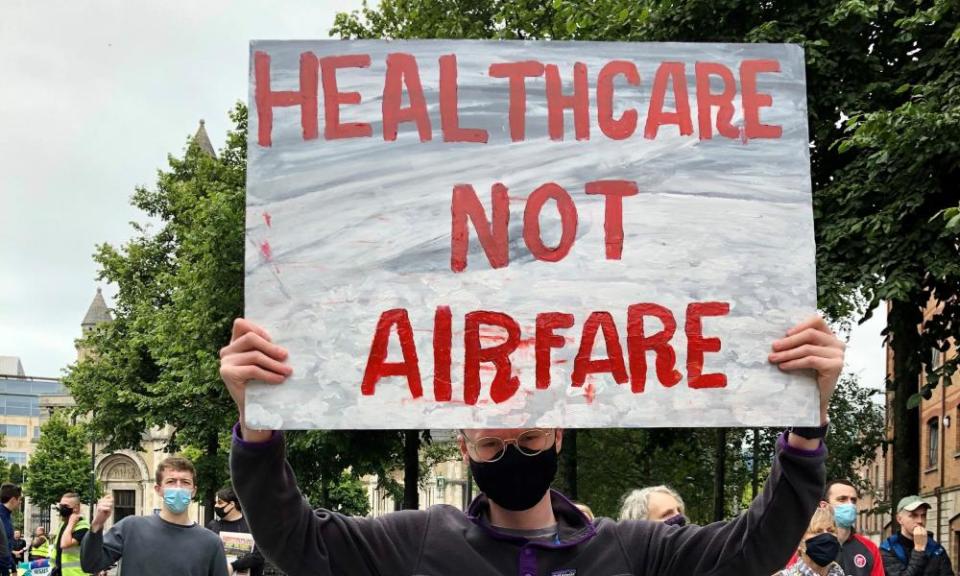Sinn Féin welcomes call for progress on Northern Ireland abortion services

Sinn Féin has welcomed a demand by the British government for progress on the introduction of abortion services in Northern Ireland, as the party denounced Democratic Unionist opposition to the provisions as “shameful and disgraceful”.
Northern Ireland’s deputy first minister, Michelle O’Neill, accused the DUP and the Ulster Unionist party of trying to reverse legislation imposed by Westminster in 2019, which provided for terminations in cases of fatal foetal abnormalities.
“This is madness that needs to stop. Women are entitled to this. It needs to be delivered,” said the Sinn Féin leader at Stormont.
She was speaking after Brandon Lewis, the Northern Ireland secretary, wrote to the first minister, Paul Givan, and O’Neill to say he would soon “have no alternative but to take further steps to ensure that women and girls have access to abortion services as decided by parliament, and to which they have a right”.
O’Neill said: “I’m glad that I have the correspondences from Brandon Lewis that they will move if this blockage doesn’t end, they’ll move to commission the services. It’s long overdue and needs to happen now.”
Related: Northern Ireland Office may directly instruct trusts to offer abortion services
Abortion was decriminalised in Northern Ireland in October 2019 after a Westminster vote and a supreme court challenge to laws that forced women with babies with fatal foetal abnormalities to travel across the Irish Sea for terminations.
There were 22 terminations of pregnancy in hospitals in Northern Ireland during 2019-20, according to the local department of health. The services are not widely available, which means some women seeking an abortion beyond 10 weeks in their pregnancy have had to travel to Great Britain for legally permissible terminations.
The charity Informing Choices NI said four of the five health trusts were offering medical abortions (via oral pills) for pregnancies up to 10 weeks but no extra funding or services had been provided to women seeking terminations for pregnancies of between 12 and 24 weeks since the abortion laws came into force in April 2020.
It said three health trusts had suspended early medical abortion care over the past year because of lack of staff, and on had not resumed the service at all.
“As a result of the ongoing failure to commission abortion services, women continue to be forced to travel to Great Britain. Three hundred and seventy-one people made this lonely journey from Northern Ireland in 2020 during the height of the Covid-19 pandemic,” said Ruairi Rowan, the charity’s director of advocacy and policy.
The Northern Ireland executive at Stormont has been formally directed by Lewis to commission the services before the end of March 2022.
“It’s really disgraceful and shameful that at this stage, over a year after it was legislated for, the DUP and the Ulster Unionist party have failed to commission, or blocked services actually being commissioned, to provide that care for women whenever it’s needed,” said O’Neill.
Two weeks ago Lewis said he was “hugely disappointed” that the Northern Ireland executive and Department of Health were “continuing to seem to wilfully neglect the welfare and rights of women and girls in Northern Ireland”.
There has also been criticism of Sinn Féin for abstaining on a vote at committee stage on a DUP-proposed amendment to the law to ensure there is no opening for future legislation allowing for abortions in the case of non-fatal foetal abnormalities.
Sinn Féin said the amendment, tabled by Givan, was a “deflection” designed to appeal to the DUP’s anti-abortion voters. Sinn Féin said it had no option but to abstain as it was opposed to abortion for non-fatal abnormality pregnancies and this was the position it took when abortion was legislated for in the Republic of Ireland, where it is the main opposition party.

 Yahoo Movies
Yahoo Movies 